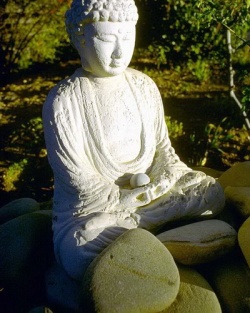Five natures
five natures
五性 (Jpn go-sho )
(1) Also, five distinct natures. A doctrine set forth by the Dharma Characteristics (Chin Fa-hsiang; Jpn Hosso) school, dividing human beings into five groups according to their inborn capacity for enlightenment. Five Natures The natures of
(1) Bodhisattvas,
(2) Sravakas and Pratyekabuddhas,
(3) ordinary good people,
(4) agnostics,
(5) heretics.
The five groups are
(a) those predestined to be voice-hearers,
(b) those predestined to be cause-awakened ones,
(c) those predestined to be bodhisattvas,
(d) an indeterminate group, and (e) those without the nature of enlightenment.
The first group can eventually attain the state of arhat, and the second group, that of cause-awakened ones, or pratyekabuddha.
Neither of these first two groups can attain Buddhahood, however.
The third group, those predestined for the realm of bodhisattvas, seeks Buddhahood and will eventually attain it.
These three are called the determinate groups because the kind of enlightenment they will achieve is predetermined.
People in the fourth group possess two or all of the three natures of voice-hearers, cause-awakened ones, and bodhisattvas, but which of these natures will develop is not predetermined; therefore they are called the indeterminate group.
Among them, only those who develop the nature of the bodhisattva can eventually attain Buddhahood.
Those in the fifth group cannot attain Buddhahood, nor can they attain the enlightenment of voice-hearers or cause-awakened ones; instead they can only transmigrate through the six paths for eternity.
Thus only those predestined as bodhisattvas and those among the indeterminate group who develop the bodhisattva nature can attain Buddhahood.
This doctrine is based on the Lankavatara Sutra and the Revelation of the Profound Secrets Sutra.
It led to an intense dispute with the Tendai school, which asserted that all living beings possess the Buddha nature and therefore can attain Buddhahood.
(2) Another similar classification of people's inborn capacities set forth in the Perfect Enlightenment Sutra:
(a) the nature of common mortals,
(b) the nature of those of the two vehicles (voice-hearers and cause-awakened ones),
(c) the nature of bodhisattvas,
(d) the indeterminate nature, and
(e) the nature of non-Buddhists.
